As part of our ongoing efforts to improve our mission delivery and ensure the sustainability of our organization, we are announcing some upcoming changes to our sports and competition programming.
These changes revolve around formalizing our sports advancement framework (see more below) and standardizing the process for how we categorize our sports. They represent a long-needed adjustment to our programming and are ultimately designed to ensure that sports with high or growing interest and consistent engagement are given the opportunity to expand.
These criteria will also establish that all sports will be required to have qualifying events prior to advancing to a state-level competition, creating more meaningful and equitable experiences at our regional and state competitions.
What is Sports Advancement?
“Sports advancement” refers to 1) how sports advance from one level of competition to the next and 2) how Special Olympics Washington will respond when adding a sport or when sports are declining.
Our criteria for sports advancement are based on general rules established by Special Olympics International. To determine how a sport will advance, all SOWA sports are categorized as one of the following:
- Official Sport: Sports that represent 2% or more of total athlete and Unified partner participation (or more than 200 participants). These sports will compete at every level of competition, including State Games.
- Emerging Sport: These are new or growing sports with at least 2% of athletes and Unified partners (or at least 200 participants). An Emerging Sport is placed in a two-year probation period to determine if it is eligible to be added as an Official Sport or if it will stay a Locally Popular Sport.
- Locally Popular Sport: A sport with participation of less than 2% of total athletes and Unified partners or less than 200 participants. Locally Popular Sports may be eligible for limited competition locally and beyond through a special waiver.
After a thorough evaluation of our sports offerings, participation numbers and financial models, several takeaways emerged:
- Of the 20 official sports we offer, ten (10) sports account for more than 92% of our total participation. These sports are basketball, bowling, soccer, athletics, bocce, cheerleading, flag football, golf, softball and swimming.
- Ten (10) sports account for only 8% of total participation.
- Of the 10 sports with the lowest participation, historically, all have automatically qualified for regional and/or State Games.
- Snow sports cost ~$189,000 for Winter Games attendance.
- These sports are also more dependent on costly infrastructure, like resort rentals, gear, and transportation, which continues to rise.
For us to grow our sports with the most participation and nurture emerging sports, while also being good stewards of our resources, it became clear that adjustments are needed to our programming.
Upcoming Changes: Winter Season 2025-2026
With all the above factors in mind and based on the criteria listed, we have determined that starting with the 2025-2026 Winter Season, these sports will be considered Locally Popular Sports and as a result, region and state-level competitions will be no longer be offered:
- Alpine Skiing
- Cross Country Skiing
- Snowshoeing
- Figure Skating
- Speed Skating
- Snowboarding
- Snowshoeing
To be clear, these sports are not being eliminated—they’re being reset. Teams are encouraged to continue training in these sports.
Prioritizing the sports with the highest participation allows us to offer more meaningful competition opportunities, enhance athlete engagement, and better manage resources. At the same time, this reset creates space to nurture our lower-participated sports and lay the foundation for their future growth.
As we plan for the future, Special Olympics Washington is launching Sports Resource Teams for each sport we offer in the state, and we need your support to make them successful.
Sports Resource Teams will be made up of dedicated coaches, athletes, Unified partners, sport officials, and other subject matter experts who are passionate about their sport. The Sports Resource Teams will help shape the future of their sport by developing recommendations around rules, policies, and best practices. They will also support compliance, coaches’ education, and athlete development pathways, all while focusing on the growth, sustainability, and long-term success of the sport. You can learn more and sign up to join a Sports Resource Team here.
We know this is a lot to digest and we want to provide a platform to address any questions you may have. We encourage you to submit your feedback and questions regarding these changes using this form.
Thank you for your understanding and for your support of Special Olympics Washington.
Resources and Links
- Link to feedback form: https://bit.ly/3RcDzrr
- Link to sign up and join a Sports Resource Team: https://bit.ly/4lxJ9m4
- For more details around our Sports Classification and Advancement criteria, please read this.



